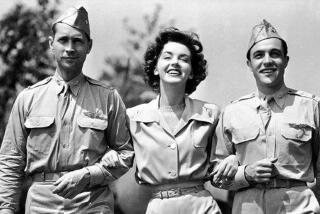Patty Hearst Enjoys New Role as One of ‘Odd People’ in ‘Cry-Baby’
- Share via
BALTIMORE — When John Waters approached Patricia Hearst Shaw two years ago at the Cannes Film Festival to be in his next movie, she thought it was a joke.
Then the script for “Cry-Baby” arrived in the mail.
“I thought, ‘Oh, no, he was serious,’ ” said Hearst, who was recently in Baltimore promoting the film, whose credits simply refer to her by her well-known maiden name. In the film, she has a small part as a street-crossing guard who is the wife of a school bus driver, played by David Nelson, and the mother of a juvenile delinquent, played by former teen porno star Traci Lords.
“I knew he cast odd people,” said Hearst, who lives in Westport, Conn., with her husband, Bernard Shaw, an executive with the Hearst Corp., and two daughters, Gillian and Lydia. “And I loved ‘Hairspray.’ So I read the script, and I thought it was really funny, and I thought it would be a lot of fun to do. It’s not like being asked to be in ‘Halloween.’ I wouldn’t even think about that. But to be in one of John’s movies, it was like, ‘Wow, OK.’
“It was a chance to do something totally different that maybe would surprise people. (It would be) something really silly, and I thought it would be neat.”
Hearst describes her meeting with Waters after he sent her the script.
“I realized I was in big trouble because there were all these people, like the casting director and the producers, on a sofa, and there’s all these pictures of actors and actresses scattered all over the floor,” she said, “and I thought, ‘Uh-oh. This is like a casting call.’
“So we talk, and he says, ‘You look too young. I don’t know how we’re going to make you look older.’ And I’m thinking, ‘I saw “Little Big Man.” I know what they can do to make me look older.’ So I say, ‘Oh, well, thank you.’
“And then (Waters) says, ‘Can you read for me?’ And I go, ‘Huh?’ because I read this thing like once. I just didn’t think this was what I was going to be doing. And so I do a horrible, horrible reading and walk out thinking, ‘Well, there’s just no way.’ And two days later, they call me and say I got the part.”
Arriving on the set in Baltimore was strange at first.
“You could see (the other actors) looking like, ‘Jeez, can you believe he hired somebody who doesn’t know anything about this?’ They were worried because it’s their careers,” she said.
Said Waters: “I think she probably had fun. It was like going to a different world--a safe, different world, a different world that ended her up in Vanity Fair.”
Did she think she would be exposing herself to a press that would be dredging up her past again?
“I just don’t know what could possibly be dredged up anymore that hasn’t been,” said the San Francisco newspaper family heiress. “There seems to be enough other things to talk about. I don’t know; I’m not that worried about it. I know I’m tired of it. It’s been 15 years, and I’ve moved on, and to me, it’s just old news.”
The “old news” started in February, 1974, when the then-19-year-old student was kidnaped from her Berkeley apartment by members of the Symbionese Liberation Army, a revolutionary group that held her hostage. Two months later, she announced in a taped message that she had repudiated her former life, joined her captives in their political struggle and had taken the name Tania. She later participated in a bank robbery and a shoot-out at a sporting goods store.
After going underground for 1 1/2 years, she was arrested, put on trial, convicted of bank robbery and use of a firearm in the commission of a felony and sentenced to seven years in prison. In 1979, then-President Jimmy Carter commuted her sentence after she had served 23 months in a federal prison.
“She had a bad lawyer (F. Lee Bailey),” said Waters, who attended her trial in 1976 as a fan of criminal trials. “He made her plead the Fifth Amendment, which always makes you look guilty. Even I could have gotten her off.”
More to Read
Only good movies
Get the Indie Focus newsletter, Mark Olsen's weekly guide to the world of cinema.
You may occasionally receive promotional content from the Los Angeles Times.









